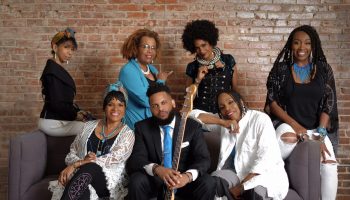
Gabriel Weber
Staff Writer
Brookings Institution President Cecilia Rouse and American Enterprise Institute President Robert Doar will speak on the state of our democratic republic and how Americans can find common ground, opening up the theme week of “The Future of the American Experiment” at 10:45 a.m. today in the Amphitheater.
Rouse and Doar will kick off a weeklong series of conversations between scholars at American Enterprise Institute and Brookings Institution that bring differing political perspectives together to focus on solutions.
In the approaching exchanges of the week, intellectuals will dive deep into specific topics like economics, cultural issues and foreign policy. Doar and Rouse will do a general overview on the United States’ place in the world and the role of the think tank in the American political discussion, Doar said.
Prior to being president of American Enterprise Institute, Doar ran AEI’s poverty studies program and spent 20 years managing social services programs in New York City; he has experience in running programs that are focused on helping low-income Americans move up economically, Doar said. Before her position as president of Brookings Institution, Rouse served as chair to the Council of Economic Advisers — serving the Clinton and Obama administrations — and was dean of the Princeton School of Public and International Affairs.
Brookings Institution’s mission is to conduct in-depth research to improve policy and governance at local, national and global levels. AEI is a private institution dedicated to research and education on issues of government, politics, economics and social welfare.
Both organizations are non-profits, non-partisan and are based in Washington D.C. — on the same block, no less — however, their approach to the world differs; AEI is more for free market, for less regulation and a smaller market, Doar said. The varied positions of the two well-known and established institutions allows for an enriching challenge.
“The competition of ideas is what makes for healthy democracy,” Doar said. “On the other hand, there are also some issues where some of our scholars can come to an agreement on. We look for those opportunities. We’re always civil, we’re always straightforward, we always try to be empirical and focus on the facts, but sometimes we come to different conclusions; when we do, we challenge each other, and that’s good.”
Doar’s aim at AEI is to back the highest quality thinkers who support the institute’s objective of expanding freedom, increasing individual opportunity and strengthening the free enterprise system in America and around the world. In hiring these thinkers, Doar said they’re urged to contribute to the political discourse and testify in Congress and include their viewpoint in discussions for the biggest impact.
“My goal is to bring the most talented, interesting writers and scholars to AEI and let them do their work. We don’t have institutional positions,” Doar said. “We let scholars stand for their own. We have Democrats and Republicans, conservatives and liberals.”
In analyzing Brookings’ role in constructively moving forward in the policy research area, Rouse finds that action after consideration is paramount.
“We can’t just stop with the analyzing what we don’t like or even just identifying the problem,” Rouse said on “The Current,” Brookings’ podcast. “If Brookings is really going to contribute to making public policy better, then what new ideas are we bringing to the table? If we’re going to make progress, we have to bring new ideas to the table.”
Maintaining that the United States has the strongest economy and military power in the world, along with the leading technology companies, Doar feels confident that the disputes between the executive branch, Congress and the courts will be settled and resolved in a way consistent with our constitutional governance.
“I’m very confident about the American experiment. I think it’s one of the great gifts to the world; we’re about to celebrate the 250th anniversary of the Declaration of Independence, and that was a major turning point in the history of societies,” Doar said. “All in all, the American experiment has been a success, and we are going through a period where some people feel that there are fundamental challenges. I don’t happen to agree.”
This is where the role of trust comes in. Doar believes that, due to a variety of factors like media, the education system and Hollywood culture, Americans don’t have faith in their institutions.
“There’s an enormous amount of cynicism and negative views, and that’s very sad, but the only way to fight that is to lay out the facts that show why that lack of faith is unjustified,” Doar said. “What I would caution against is people translating that lack of trust — which is in some respect justified because of performance — to a lack of trust and faith in our constitutional system. There, I think it’s not justified. Free market capitalism has raised the income of more people in the world by far more than any other system and brought more people out of poverty than any other system.”




